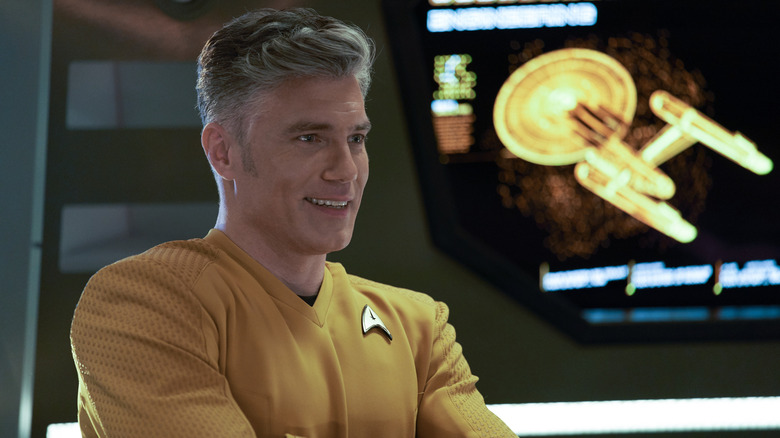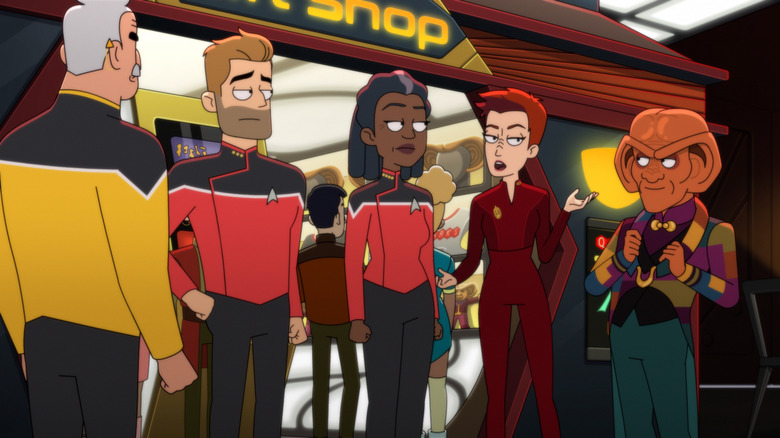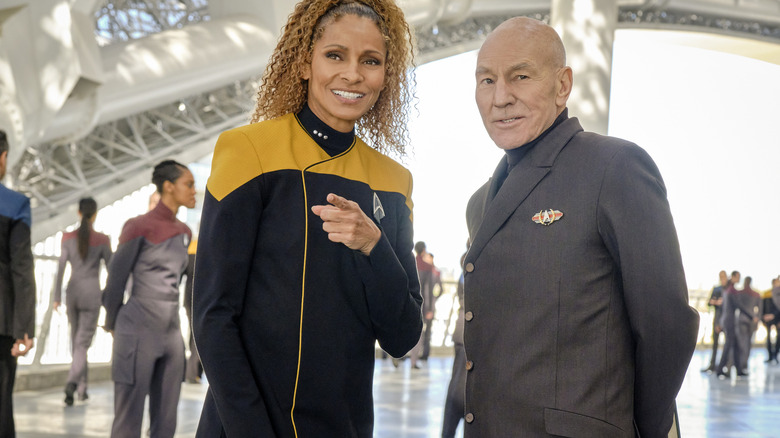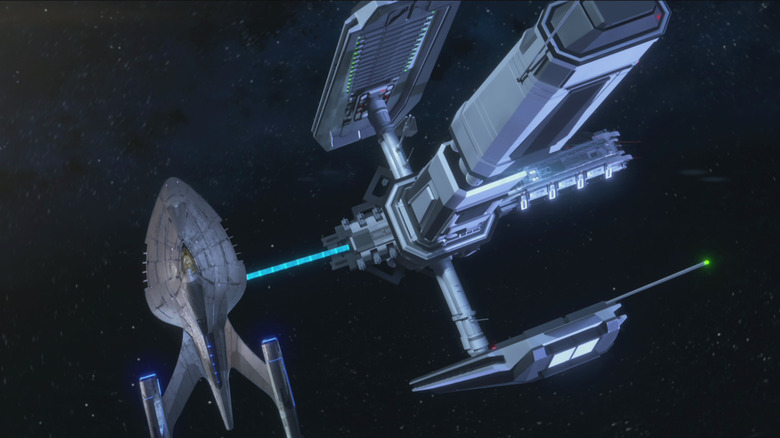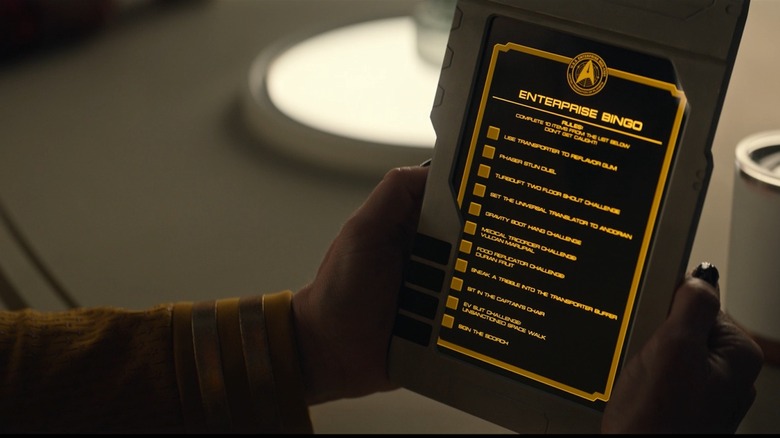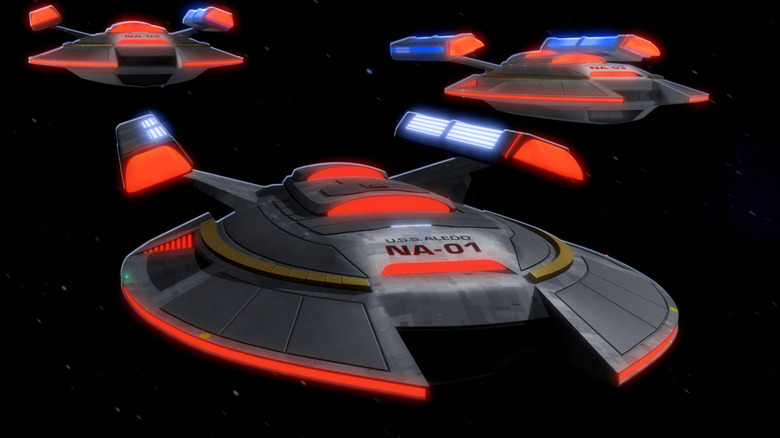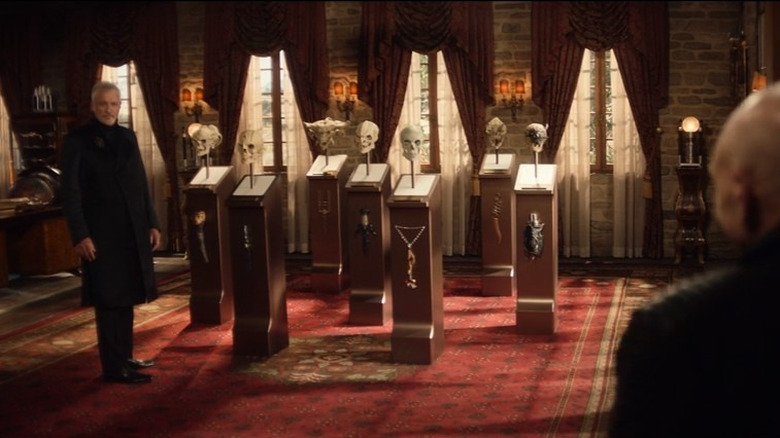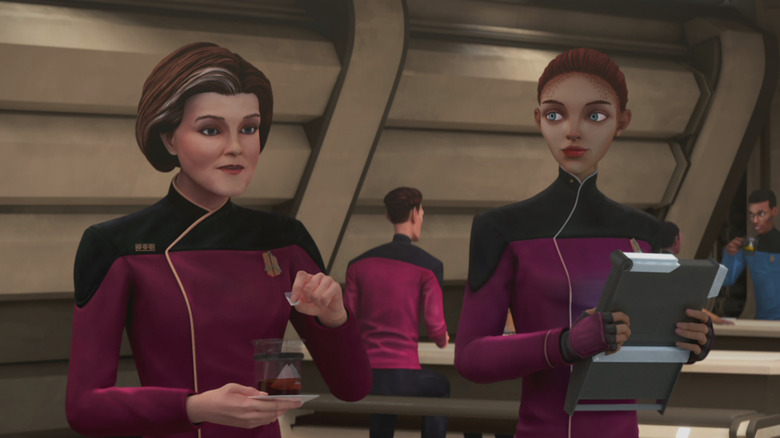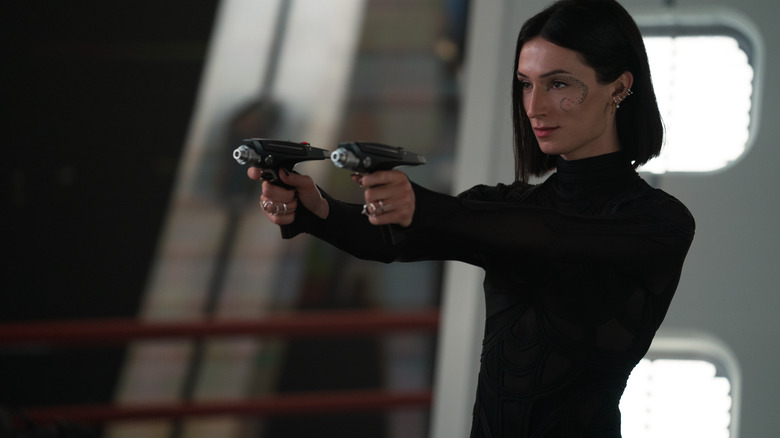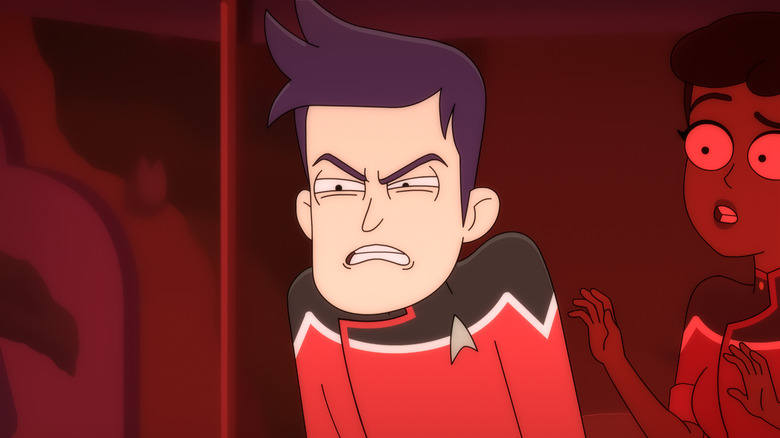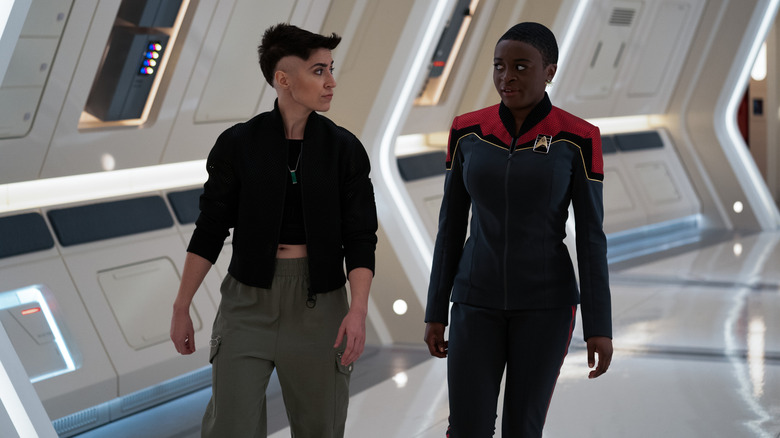The Greatest Star Trek Moments Of 2022
2022 saw the release of 45 new episodes of "Star Trek" — the highest volume of "Star Trek" that audiences have been treated to since the 1990s heyday of the franchise. 1996 and 1998 it seems, still hold the record for Most Treks, as both years saw the airing of 54 one-hour "Star Trek" episodes between "Deep Space Nine" and "Voyager," as well as the theatrical releases of "Star Trek: First Contact" and "Star Trek: Insurrection," respectively. TV, of course, has changed dramatically in the age of streaming, and average TV seasons now run a mere 10 episodes rather than the old-world 26.
2022 certainly holds the record for greatest variety of "Star Trek," as five separate shows are now running concurrently. There was the conclusion of the fourth season of "Star Trek: Discovery," the entire second season of "Star Trek: Picard," the entire third season of "Star Trek: Lower Decks," the concluding end of the first season of "Star Trek: Prodigy," and the inaugural season of "Star Trek: Strange New Worlds." Paramount is putting all its eggs in one basket, and Trekkies are being spoiled in the process.
Some of the shows were quite bad, others were very, very good. Overall, the year was peppered with interesting "Star Trek" moments that elicited laughs, thrills, and nostalgia. Here are some of the best.
The U.S.S. Cerritos visits Deep Space Nine
"Star Trek: Lower Decks" functions perfectly well as an animated "Star Trek" comedy, but it also serves as an elaborate Easter egg hunt for old-world Trekkies. Not an episode passes without a deep-cut reference to, say, a line of dialogue from an older program. This is a show that makes references to "Star Trek: The Animated Series" and features a talking Franklin Mint Star Trek collector's plate. In the episode "Hear All, Trust Nothing" (September 29), the series went whole-reference-hog, and had the crew of the U.S.S. Cerritos visit Deep Space Nine, the eponymous station from "Star Trek: Deep Space Nine." Nana Visitor and Armin Shimerman reprised their roles as Kira Nerys and Quark respectively, and the show's designers carefully recreated the space station in all its immaculate detail. Even Morn makes a cameo.
The references are so authentic that Trekkies may find themselves having to watch the episode a second time. The first time would be to thrill at revisiting a beloved 1990s Trek series, and the other would be to listen to dialogue and understand the episode's story.
Picard gets back to status quo
"Star Trek: Picard" stands apart from traditional Trek canon in many ways, most notably in that it doesn't take place on a starship. The series follows a now-elderly Jean-Luc Picard (Patrick Stewart) and his adventures with a new group of friends who find themselves in various crises. He is not the captain of a ship, he does not wear a uniform, and most of the series takes place out in open cities rather than up in the stars.
After a lackluster first season about a Romulan conspiracy, a magical future-predicting machine, and an interdimensional robotic Cthulhu monster, it was refreshing to open the second season on more familiar grounds. In "The Star Gazer" (March 3), Picard gives a graduation speech at a clean, gleaming Starfleet Academy where Elnor (Evan Evagora) has become an officer. Raffi (Michelle Hurd) is also back in uniform, and is pursuing a relationship with Seven (Jeri Ryan). Dr. Jurati (Alison Pill) is conveniently exonerated of murder. And Captain Rios (Santiago Cabrera) is back in the captain's chair. For a few fleeting moments, "Star Trek: Picard" feels like it takes place in the Trek universe proper.
The second season eventually collapses like a soufflé — a soufflé that was dropped off a cliff — but it starts so promisingly.
Prodigy is Star Trek again
When "Star Trek: Prodigy" debuted, it left viewers with multiple tantalizing mysteries. A group of teenagers — living in an unknown time and place — discover an abandoned Federation starship called the U.S.S. Protostar. Once onboard, they learn from a hologram of Captain Janeway (Kate Mulgrew) how to behave like Starfleet officers. For many episodes, audiences didn't know how far in the future this all took place, or the location of the show's events. It could have been thousands of years beyond current Trek canon. In being so removed, the show's writers fell back on some unfortunately familiar character types that are more often seen in "Star Wars" than in "Star Trek." There was an evil Emperor character, a robotic Darth Vader character, an Wookiee-like engineer character, and a pair of leads that felt all too similar to Luke Skywalker and Han Solo.
However, as the second half of season 1 begins, the characters learn enough about the Protostar to free a group of enslaved children, delegate responsibilities, and consider themselves Starfleet cadets. They even wear the uniforms. The characters begin visiting distant Starfleet outposts, cementing the time and place of "Prodigy" ... and also feeling properly explorative. It seems "Prodigy" got the "Star Wars" out of its system and is ready to settle down.
Enterprise Bingo
On the episode of "Star Trek: Strange New Worlds" called "Spock Amok" (June 2), the Enterprise crew is granted a few days of much-needed shore leave. To make sure the ship functions properly, however, Commander Chin-Riley (Rebecca Romijn) and Lt. Noonien-Singh (Christina Chong) have to remain on board. Neither of them seems to mind, however, as they are among the least social of the crew and are perfectly comfortable staying on duty. In patrolling the ship, they find a few ensigns playing pranks and getting into mischief. As it happens, ensigns on the Enterprise engage in a fun ritual they call "Enterprise Bingo."
In order to better understand their crew, Chin-Riley and Noonien-Singh decide to try out Enterprise Bingo for themselves. They chew gum in the transporter to see if its flavor will be restored. They climb out to the exterior of the ship to etch their initials in the hull. Harmless stuff, but difficult to pull off. In so doing, two otherwise serious characters begin to understand their fellow officers a little bit better. It's delightful.
The California class charges to the rescue
The final episode of the third season of "Lower Decks" — called "The Stars at Night" (October 27) — sees a trio of artificially intelligent drone-like starships going rogue and opening fire on a Starbase. The ships, part of the experimental Texas class, are likely to continue on their path of destruction, if not for a last-minute intervention by the U.S.S. Cerritos ... and every other ship belonging to the California class. Throughout "Lower Decks," it has been repeatedly stated that California-class starships are underpowered and disregarded when compared to Starfleet's finest. The characters on "Lower Decks" suffer from the ultimate indignity in "Star Trek": a lack of prestige.
So when the entire California class is allowed to band together to take out Texas, audiences are allowed a brief moment of pride. California natives will especially get a kick out of hearing the names of the ships, which are all named after inauspicious cities in their home state. Among them are the U.S.S. Carlsbad, the U.S.S. Fresno, the U.S.S. Mt. Shasta, the U.S.S. West Covina, the U.S.S. Culver City, the U.S.S. Pacific Palisades, and the U.S.S. Riverside.
Picard's skull room
The second episode of "Star Trek: Picard" — called "Penance" (March 10) — saw Q (John de Lancie) whisking Picard off to an alternate dimension very similar to Trek's notorious Mirror Universe. In it, Earth has become an aggressively fascistic planet that is scouring the galaxy for enemy species and wiping them out entirely. In this dark universe, Picard finds himself occupying the body of his own "evil" alternate self, a hard-edged and murderous General that collects the skulls of his victims. Q points out that something happened centuries before that set Earth on its dark path, and that tiny twists of fate are the only thing required to dictate either a utopia or a dystopia.
To show off what a monster Evil Picard is, Q tours the man's trophy room. Familiar characters like Gul Dukat, the Grand Nagus, and Sarek are in the room, all in skull form. It's a wicked, haunted house moment of horror that makes "Picard" — however briefly — a fun show. However grim the scene may be, onlooking Trekkies likely salivated at the idea of owning their very own Cardassian skull prop to include in their tchotchke collections.
Janeway switches to tea
In "Star Trek: Voyager" episode "The Cloud" (February 13, 1995), Captain Janeway (Kate Mulgrew) was dismayed by the lack of coffee beans on board her ship. This was during the show's earlier episodes, so resource management was still a concern, and the captain was not allowed to merely replicate a cup of her favorite beverage. When a nearby nebula might possibly provide a new energy source for the ship, Janeway proudly directs her crew toward it. "There's coffee in that nebula" she proudly states.
Janeway's drive to coffee remained a constant throughout the series, and, by 2022, had become a meme of its own.
How sad — and hilarious — that Janeway would eventually be ordered by her doctor to switch to tea. In the "Prodigy" episode "Let Sleeping Borg Lie" (November 3), now Vice Admiral Janeway is on the hunt for the missing U.S.S. Protostar, and is constantly in a foul mood. She is seen steeping a tea bag, furious that it is not coffee. This is a fun inside joke for Trekkies, but also provides "Prodigy" with a fun character moment. Of course Janeway is gruff. She's undercaffeinated.
Captain Angel
The "Strange New Worlds" episode "The Serene Squall" (June 16), sees the arrival of a mysterious visitor named Dr. Aspen (Jessie James Keitel), who is on the Enterprise to inform Captain Pike (Anson Mount) about nearby marauding pirates. She is intelligent and fascinating to every member of the crew ... and to the audience. Her bladed fingers and awesome facial tattoo are also pretty cool. Dr. Aspen, many might hope, could become a regular feature on the show.
Viewers got their wish when Dr. Aspen reveals herself to be the wicked Captain Angel in disguise. Captain Angel is, in fact, one of the very pirates that she claimed to be warning the Enterprise about, and uses her position on the ship to infiltrate and take over. Captain Angel, however, is more than an off-the-rack "Star Trek" villain. She also possesses a streak of cruelty — she forces Nurse Chapel (Jess Bush) and Spock (Ethan Peck) to kiss each other while Spock's intended T'Pring (Gia Sandhu) looks on.
At the end of the episode, Captain Angel flees, promising to return. It had been awhile since Trekkies felt such a thrill at the potential return of a guest villain.
Boimler loses it
In the "Lower Decks" episode "Reflections" (September 22), Ensigns Boimler (Jack Quaid) and Mariner (Tawny Newsome) are given the unenviable task of manning a Starfleet recruitment booth at some kind of futuristic jobs fair. They must stand under an awning, yell at passers-by, and sell them on the idea that Starfleet is a pretty nifty organization. Everyone who walks past is seemingly indifferent or, odd for "Star Trek," uninformed ("Do you guys do engineering?"). Neighboring Boimler and Mariner are tents occupied by much more exciting, sexier professionals, each one collecting more signatures on their clipboards. Being a roguish archaeologist is certainly more fun than wearing uniforms and taking orders. Even the collectors and board game enthusiasts giggle at Starfleet.
Boimler, with each jibe, grows increasingly furious. When someone steals his rank pip and throws it on the ground, Boimler cracks and begins screaming obscenities.
The outburst, however, is one of passionate defense of Starfleet. He wails that Starfleet is about mapping quasars and exploration and their missions of battle are not what they live for. He screams that structure is preferable to ass-scented collector's warehouses. It's a hilarious moment of release, but it also reveals how deeply devoted Boimler — and "Lower Decks" — is to Starfleet ideals.
Strange New Worlds is ... good?
It's an acknowledged truth that no "Star Trek" series starts at its strongest. The phrase "wait until season 3" has been uttered by just about every experienced Trekkie, and can be applied to almost every Trek program to date.
It was a refreshing change of pace, then, that the brand new "Star Trek: Strange New Worlds" should exit the gate as strong as it did. After having to suffer through a total of eight abysmal seasons of "Star Trek: Discovery," "Star Trek: Picard," and "Short Treks," there was little reason to be hopeful. Surprising this old cynic, "Strange New Worlds" managed to be everything "Star Trek" ought to be. It was light and funny. It adhered to an episodic structure. It featured warm, appealing characters. It was devoted to diplomacy and complicated problems. It was so good, one might find themselves growing angry that the makers of "Star Trek" had to wait so long to give it to us.
In the show's second episode "Children of the Comet" (May 12), the Enterprise has to redirect the path of a comet before it crashes into a nearby world. They are prevented from doing so by a religious sect who believe the comet to be sacred and, hence, not to be interfered with. Pike has to negotiate, revealing him to be one of the gentler captains in Starfleet. It's the kind of classical "Star Trek" episode you dream about. When it's over, everyone is in a good mood, including the viewers.
Finally, it seems that the adolescent "dark" period of modern Trek is at an end.
